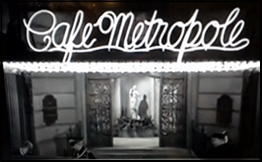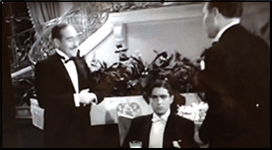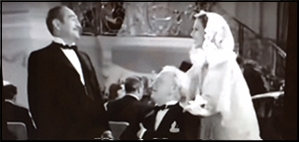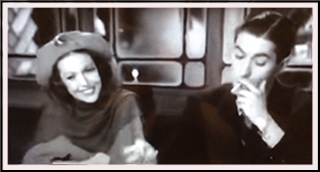Tue 17 Nov 2020
A Movie Review by David Vineyard: CAFÉ METROPOLE (1937).
Posted by Steve under Films: Drama/Romance , Reviews[6] Comments

CAFÉ METROPOLE. 20th Century Fox, 1937 Loretta Young, Tyrone Power, Adolphe Menjou, Charles Winninger, Helen Westley, Gregory Ratoff, Christian Rub. Screenpla: Jacques Deval. Story: Gregory Ratoff Directed by Edward H. Griffith.
This Hollywood take on French farce written by character actor Gregory Ratoff could use a bit less romance and a bit more farce, but thanks to the cast and an intelligent screenplay has more than enough charm to get by.
There are no real crimes here, though the police are certainly involved. It’s the sort of film where everyone is conning everyone else, sometimes even themselves.
Monsieur Victor (Adolphe Menjou) owns the Café Metropole and his accountant Maxl (Christain Rub) has just informed him he is in the red and the auditors are coming. He needs to think and act fast, but luckily for Victor things are already falling in place in the person of an American millionaire Joseph Ridgeway (Charles Winninger), his sister Margaret (Helen Westley) and his daughter Laura (Loretta Young) who are arriving soon and hoping to meet celebrities and royalty. If Victor can arrange a royal romance, he might get the money he needs from Winninger.
All he needs to arrange that is the right man, and who should show up but flat broke American heir Alexander Brown (Tyrone Power), who manages to fall in debt at the gaming tables to Victor with a rubber check bouncing around signed by him.
But everything will be just fine if Alexander Brown becomes the Russian Prince Alexi Paneiev and charms the beautiful Laura.

And almost immediately things get complicated. Alexander and Laura meet before they know who the other is (or is supposed to be) and actually start to fall in love, Daddy Ridgeway smells a rat (though the wrong one), and Paul the waiter (Gregory Ratoff) proves to be the real Prince Alexi more than a little incensed by the impostor.
Power and Young, who were virtually a screen team, play their parts with effortless charm, their combined beauty and screen presence, even as male and female ingenues, enough to carry any film, but this one doesn’t have to rely on that alone, with Menjou as the suave continental con man Victor, Winninger the slightly befuddled comical American millionaire, Westley his sharp witted sister and advocate for Laura, and Ratoff a proud, haughty, but for sale Russian prince.

Menjou specialized in variations on this jaded but still romantic charmer no more honest than was required by the circumstances. What energy the film has comes mostly from him, Ratoff, and Westley, though Young gets her turn at the end.
Power bridled at these sort of roles eventually and welcomed a chance after the War to play something with a bit more depth.
Young proves smarter and tougher than anyone expects when Alexander wants out of the con game and gets framed by Victor to get money from Ridgeway, and this being American and not quite French farce, there is little edge and no sex considering the model here is known for both.

This isn’t Lubitch, Billy Wlder, Preston Sturges, or Mitchell Leisen, and their deft hand at this sort of material is sorely missed, but it is still fun in a low key, all white tie and tails, elegant settings, good food, great wine, beautiful young people in beautiful clothes quoting François Villon in charming cafes and gorgeous suites, and charming con artists.
The best way to describe how this material is done in the grand Hollywood style is effortless. Café Metropole is a souffle and not a meal, light, charming, romantic, and with just enough spice to keep it from being boring. Of course it is almost impossible to make this kind of film today, which may or may not be a good thing, but we will always have Paris, at least the Hollywood one.
The sharpest bite is saved for the great last line with Westley and Ratoff getting the fade out and the laugh.
“Get your checkbook out. Here we go again.â€
It’s almost enough to redeem the whole film on its own.

November 17th, 2020 at 12:36 am
David, Your observation that it would be almost impossible to make this kind of picture today is certainly true enough, and in my view, an indictment, not on the past, but our time. Beautiful people being beautiful should never be ignored, and what I like about Griffith’s take and lack of depth, there is also nothing, not a thing, in the presentation that masquerades as judgmental.
November 17th, 2020 at 8:13 am
Is there still such a thing as Cafe Society? And if so, where can I get some?
November 17th, 2020 at 9:52 am
Mae West said about Ratoff, “he has an accent that has an accent.”
November 17th, 2020 at 9:59 am
The older actor is Charles WINNINGER – pronounced WHY-ning-er.
(Don’t forget the ning.)
Mr. Winninger had a very long career as friendly old guys, going through to the early ’60s.
Just so you know …
November 17th, 2020 at 10:11 am
Thanks, Mike. All four instances fixed. (I hope there weren’t five!)
November 17th, 2020 at 8:49 pm
Barry,
No disagreement, the film has total charm and Griffith only pales a little compared to some of the most masterful directors of farce in Hollywood, which is no small thing.
Charm, grace, wit, and a sense that there is something more to life than ‘life is real, life is earnest’ is sorely missed these days, and the world is a bit less for it.
If this misses some of the edge of true farce it more than makes up for it with beuatiful people in beautiful settings having a wonderful time.